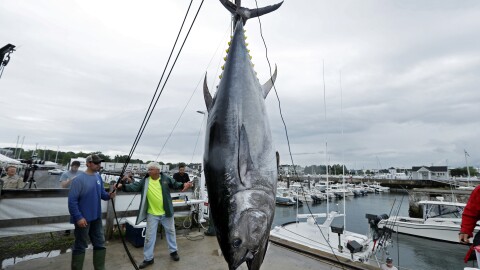PORTLAND, Maine — A federal plan that could loosen the rules about fishing for one of the most debated species in the ocean has attracted the attention of fishermen and environmentalists, some of whom fear years of conservation work could be undone.Preservation of the Atlantic bluefin tuna has long been a subject of international debate, and sometimes discord. The giant sushi fish, which occasionally sell for more than $1 million and often weigh several hundred pounds, are at a fraction of historical population levels but have shown positive signs in recent years.
The federal government is considering some changes to the way the fish are managed. The National Oceanic and Atmospheric Administration has said some of the changes would give fishermen who use longlines, a method of fishing used to catch large fish, more flexibility by increasing their amount of open fishing area, including in the Gulf of Mexico.
The Gulf of Mexico is a critical spawning area for bluefin, and parts of it are closed down to longliners in the spring to protect the fish. Reopening it to fishing could jeopardize the bluefin stock in U.S. waters and beyond, said Shana Miller, senior officer for international fisheries conservation with the Ocean Foundation.
"It would increase mortality," Miller said. "It boggles the mind why they're choosing to do this."
Longliners aren't allowed to target bluefin tuna, but they are allowed to keep some if they catch them accidentally. The potential rule change would allow longliners to operate in more territory where bluefin spawn, potentially taking more of them as accidental bycatch, Miller said.
It would also potentially open up territory off Cape Hatteras, North Carolina, and off the Northeastern states.
Opening up the territory is on the table in part because of difficulties longliners have had with catching swordfish, a more abundant species that has high economic value, said Jennie Lyons, a NOAA Fisheries spokeswoman. NOAA is taking comments about its plan to change the fishing rules until Sept. 30. Rule changes, if approved, could begin next year.
"These adjustments are being proposed in light of ongoing successes in reducing bluefin tuna bycatch in some fisheries and to address underharvests of other species — particularly swordfish — while continuing to minimize bluefin bycatch," she said.
The changes would also not impact fishermen's quota for bluefin, said Randy Blankinship, chief of NOAA Fisheries' Atlantic Highly Migratory Species Management Division.
Fishermen most often bring bluefin to the docks in the coastal New England states, especially Massachusetts and Maine, and North Carolina. Longline fishermen need better federal rules, because foreign swordfishermen are filling the void created by restrictions in the domestic market, said Dewey Hemilright, a longliner out of North Carolina.
"The U.S. fisherman is going down while other countries are shipping into our marketplace," he said.
Fishermen also harvest bluefin using harpoons and rod-and-reel gear. The possibility of negative ramifications for the fishery at large is worth considering, said Steve Weiner, a tuna harpooner out of Ogunquit, Maine.
"It's well intentioned to let them catch their swordfish, giving them more areas, more places to fish, but not if it's a detriment to bluefin tuna," Weiner said.



